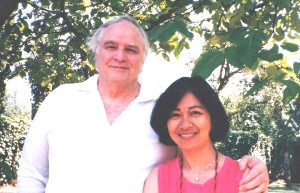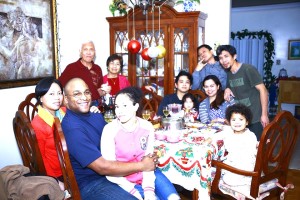Trafficked — but happier now
Cornelia Soriano showed her passport to the immigration officer in the Philippines in May 1990 and left the country. At Charles de Gaulle International Airport in France she breezed through the immigration too. But Cornelia Soriano was a fictitious name. She was, in reality, Leana Martillano, a native of Oriental Mindoro who was illegally recruited to work in Paris under a tourist visa.
Leana was a foreign service graduate but had chosen to stay at home to take care of her children. Her three children, Lyndon, Kerwin and Twinkle, were still in grade school. Rolando, her husband was a government employee. When the kids were old enough she decided to find herself. But she first had to lose her name as a trafficked OFW.
The Martillano family would be reunited only after eight years — in Toronto, Canada.
Undocumented in Paris
During her stay in Paris, Leana was known as Cornelia. She worked as a household worker and caregiver.
“I fell in love with Paris. The one-year plan to work there was extended to five years. There were lots of Filipinos, but I don’t talk about personal life with them,” Leana says.
S
he worked with three employers a day for three hours each. Among her prominent part-time employer was Marlon Brando, who was then married to his Tahitian wife.
“I worked for him for three months. He was kind and humble, telling me stories about his early life as a bouncer in a club. He ate very simple food — tea, biscuits, fruits. Mas masarap pa kinakain ko (I ate better). But kuripot (tight-fisted),” Leana laughs.
Leana did not experience discrimination in France. But being undocumented she could not travel to other countries in Europe even if her employer wanted her to come with them on holidays.
Sending remittance was difficult too. Leana says she inserted dollars in letters she sent to the Philippines. Fortunately, these letters reached her family.
One day, while at a public square, Leana came across a person who was recruiting nannies for work in Canada. Since her passport was fake, she needed to apply again at the Philippine Embassy. She applied for a passport under her real name: Leana Martillano of Calapan, Oriental Mindoro.
Canada, the land of promise
In October 1994, Leana arrived in Toronto, Canada. Her employer was a Jewish family. She changed employers after two years. She retired three years ago at the age of 65.
“In Canada, you can change employers if you don’t like them or if they’re abusive. The agency does not take your passport,” Leana says.
Depending on the income of the employer, a live-in caregiver usually receives C$2,000 When the family is on vacation there is extra pay for house-sitting. A caregiver works from 8:00 a.m. to 5:00 p.m. from Monday to Friday. Workers also have open work permits allowing them to apply for work anywhere. A migrant worker can apply for permanent residency after two years and can qualify for citizenship after three years.
After a year in Canada, Leana had her first vacation in the Philippines. She spent six weeks trying to compensate for the lost years with her family. It was a bittersweet reunion.
“I observed them for a while. My children were excited and at the same time shy. Kerwin was the first to break his shell. He was naturally talkative,” Leana says.
“I was not there to witness the important events in my children’s lives. Twinkle, my daughter was just nine years old when I left. But we endured it for the sake of a better life.”
She petitioned her children and husband after two years when she got her permanent residency status. The age limit to petition a child is 22 years old.
In 1998 Kerwin, Twinkle and Rolando arrived in Canada. They became Canadian citizens in 2002.
Lyndon arrived in 2016 after 16 years of waiting to be reunited with his family. He applied independently to be able to join his family.
Enjoying time with the family
Despite the adjustments and long hours of work, the Martillano family was able to buy a house in Toronto. Leana and Rolando are both retired and enjoying the benefits they are now reaping as Canadian citizens. They spend time taking care of their three grandchildren.
“I was a cancer survivor. If I were in the Philippines, I would have died because of the expensive treatment. I am enjoying the medical benefits here as well as our pension,” Leana says.
Still, she misses fresh Filipino produce and “pako” (fern) because these are not available in markets.
Leana says that patience, and “lakas ng loob” (daring) kept her going through the years.

Lyndon was finally reunited with his family last year after 16 years of waiting in the Philippines. CONTRIBUTED
“It is important to tell your children the reasons why you have to leave them. I am very lucky because my kids were never involved in drugs. Their only vice was mountain-climbing,” she smiles.
In raising her grandchildren, she speaks to them in Tagalog. Keanna, her two-year-old granddaughter calls her father (Kerwin) Tatay and her mother Nanay. She even calls Lyndon, Tiyo (“tiyow”) and aunt Twinkle, “Tiya(h).”
Leana’s recruiter to Paris was jailed a long time ago. She has no news about the situations of her friends who lost their legal identities in search of a better life.
Leana only hopes that they are enjoying life like she is right now.




